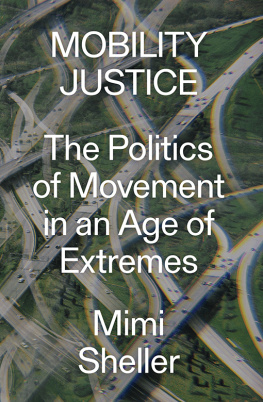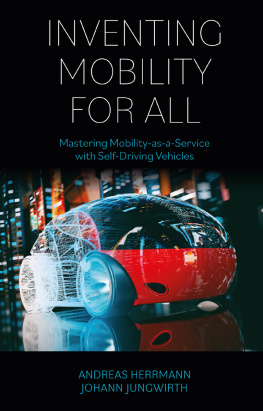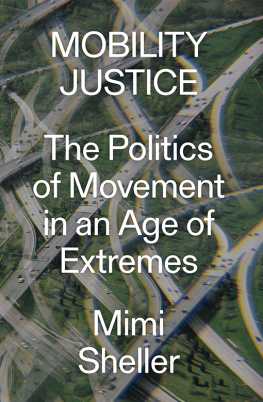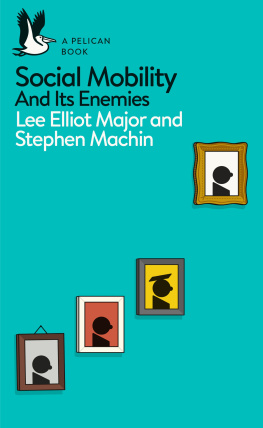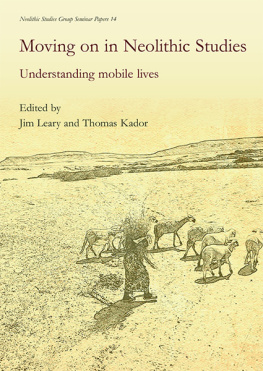Contents
This eBook is licensed to Angel Sison, doroteojosestation@gmail.com on 04/16/2020
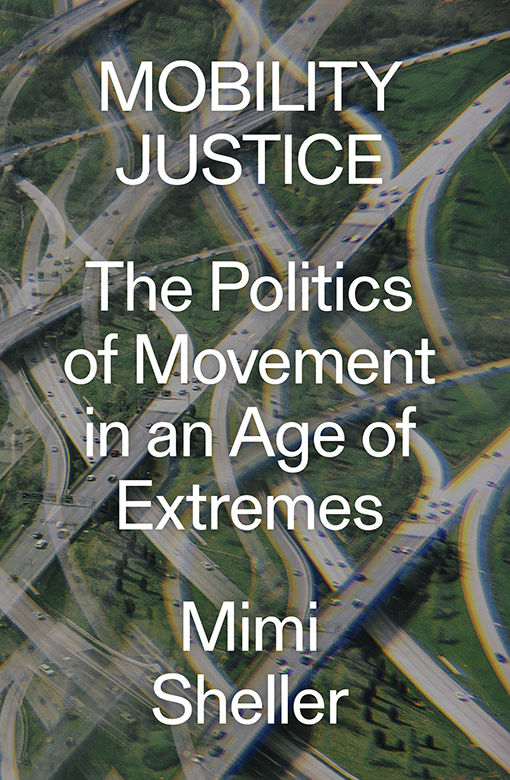
Mobility Justice
This eBook is licensed to Angel Sison, doroteojosestation@gmail.com on 04/16/2020
Mobility Justice
The Politics of Movement
in an Age of Extremes
Mimi Sheller

This eBook is licensed to Angel Sison, doroteojosestation@gmail.com on 04/16/2020
First published by Verso 2018
Mimi Sheller 2018
All rights reserved
The moral rights of the author have been asserted
1 3 5 7 9 10 8 6 4 2
Verso
UK: 6 Meard Street, London W1F 0EG
US: 20 Jay Street, Suite 1010, Brooklyn, NY 11201
versobooks.com
Verso is the imprint of New Left Books
ISBN-13: 978-1-78873-092-1
ISBN-13: 978-1-78873-095-2 (HBK)
ISBN-13: 978-1-78873-093-8 (UK EBK)
ISBN-13: 978-1-78873-094-5 (US EBK)
British Library Cataloguing in Publication Data
A catalogue record for this book is available from the British Library
Library of Congress Cataloging-in-Publication Data
Names: Sheller, Mimi, author.
Title: Mobility justice : the politics of movement in the age of extremes / Mimi Sheller.
Description: London ; Brooklyn, NY : Verso, 2018. | Includes bibliographical references and index.
Identifiers: LCCN 2018017911 | ISBN 9781788730921 (pbk.) | ISBN 9781788730952 (hbk) | ISBN 9781788730938 (UK ebk) | ISBN 9781788730945 (US ebk)
Subjects: LCSH: Emigration and immigrationSocial aspects. | Rural-urban migrationSocial aspects. | TransportationSocial aspects. | Social justice. | Environmental justice.
Classification: LCC JV6225 .S54 2018 | DDC 303.48/32dc23
LC record available at https://lccn.loc.gov/2018017911
Typeset in Minion Pro by Biblichor Ltd, Edinburgh
Printed by CPI Mackays, UK
This eBook is licensed to Angel Sison, doroteojosestation@gmail.com on 04/16/2020
Contents
This eBook is licensed to Angel Sison, doroteojosestation@gmail.com on 04/16/2020
I first want to dedicate this book to the late John Urry, who was my inspiration and mentor in so many ways, and with whom I worked, wrote, edited, and co-founded the Centre for Mobilities Research at Lancaster University in 2003, and the journal Mobilities in 2006. He was a model of academic commitment, collegiality, productivity, good humor, and humility. I want to thank my many friends and colleagues who continue to work on those projects, as well as those in the International Association for the History of Transport, Traffic, and Mobility (T2M), and in the Cosmobilities Network and the many other mobilities research networks around the world with whom I have shared inspiring conferences, workshops, and vital exchanges of ideas.
I first started thinking about a book on the concept of mobility justice after my experience of working in Haiti following the 2010 earthquake, where I joined in National Science Foundationfunded research with my Drexel University colleagues Franco Montalto, Patrick Gurian, and Michael Piasecki. I want to thank them, along with Jen Britton, Lavaud Vernet, Jean de Vernet, and Yves Rebecca, for our travels in Haiti in 2010. I also thank Michael Piasecki for facilitating my inclusion in another NSF project on climate change in Haiti and the Dominican Republic in 2012, with special thanks to Principal Investigator Jorge Gonzalez from City College of New York, and collaborator Yolanda Leon from the Instituto Tecnolgico de Santo Domingo. My reflections on this work are gathered together in my forthcoming book Island Futures: Global Mobilities and Caribbean Survival (Duke University Press, 2019), which is a more empirically grounded companion volume to this one.
Building on this initial line of thought about post-disaster uneven mobilities, I gave the Distinguished Lecture entitled Sustainable Mobility and Mobility Justice at the University of Delawares Transportation Center in 2011, and contributed chapters on that topic to the books Mobile/Immobile: Quels choix, quels droits pour 2030? edited by Christophe Gay, Vincent Kaufmann, Sylvie Landrieve, and Stphanie Vincent-Geslin (Editions de lAube, 2011); and Mobilities: New Perspectives on Transport and Society, edited by Margaret Grieco and John Urry (Ashgate, 2012). In 2013 I gave a talk entitled Mobility Capability: Social Justice and Counter-Geographies of Movement, at the Differential Mobilities Conference of the Pan-American Mobilities Network at Concordia University in Montreal, hosted by Kim Sawchuk and colleagues, where I began to see the significance of critical disabilities studies through the work of Laurence Parent; and I was invited by Inderpal Grewal to give a talk entitled Towards Transnational Mobility Justice for the Yale University series Transnational feminist research and its theoretical paradigms. I thank all these hosts and audiences for the chance to grapple with these ideas and share this evolving work.
When the 2015 refugee crises associated with war in Syria, as well as the impacts of violence across North Africa, Central America, and Mexico, drove so many people to meet death while seeking safety, I began to see the need for a more general book addressing a wider global theory of mobility justice. I was also influenced by the rise of the Black Lives Matter movement and the growing protests by Indigenous peoples movements against mining, hydroelectric dams, and largescale infrastructure projects around the world. I would not know about many of these mobilizations if it were not for my wonderful network of activist colleagues and, yes, thank you, Facebook friends. I also want to thank bicycling justice advocate Adonia E. Lugo, founder of the Bicicultures Network and member of the Untokening project, and Olatunji Oboi Reed, co-founder of the Slow Roll Chicago Bicycle Movement and the mobility justice advocacy group Equiticity, for introducing me to these grassroots multiracial mobility justice movements and sharing their insights and experience.
Esther Figueroa, my brilliant collaborator on Fly Me to the Moon, a documentary film about bauxite mining and aluminum, has also been a constant source of inspiration and encouragement in thinking about global resource extraction, human rights, and planetary ecologies. I also take inspiration from the work of Deborah Cowen, Stephen Graham, Lisa Parks, and others working so creatively on infrastructure, with special thanks to Stephen for the introduction to Verso. I want to thank Diane Davis, Neil Brenner, and Gareth Doherty at Harvard University Graduate School of Design for invitations to speak there about aluminum, infrastructure, and mobilities.
Thanks to Malene Freudendal-Pedersen and Joergen Ole Baerenholdt, I was greatly honored to be awarded the Doctor Honoris Causa from Roskilde University, Denmark, in 2015, where in my honorary address I first described the different scales of justice that became the structure of this book (and apologies to the wonderful questioner who wanted me to also cover the nano-scale mobilities internal to the human bodyI could not manage to fit it all in this book!). Thanks also to Sven Kesselring and Ole B. Jensen for ongoing discussions, conversations, and invitations to participate in events you have organized.
At the Society for Caribbean Research in Hanover, I gave the keynote address entitled Caribbean Constellations and Mobility Justice in 2015, and another keynote address entitled Mobility Justice and the Temporalities of Multi-Scalar Migration at a workshop called Mobilities and Temporalities, organized by Brenda Yeoh at the National University of Singapore in 2016. I also spoke on the topic at panels of the American Association of Geographers annual conference in San Francisco and at the T2M annual conference in Mexico City in 2016, and gave public lectures on various aspects of the book at Grinnell College in Iowa, Simon Fraser University in Vancouver, and at the Harvard Graduate School of Design. And lastly, in 2017, I gave keynote talks drawing on this book at the Australian Sociological Association, with thanks to Farida Fozdar, and on the occasion of the launch of the Australian Mobilities Network, with thanks to David Bissell. I thank the many people who have hosted me at these events, who have attended related teaching workshops, and the engaging audiences whose questions helped shape my thinking.

